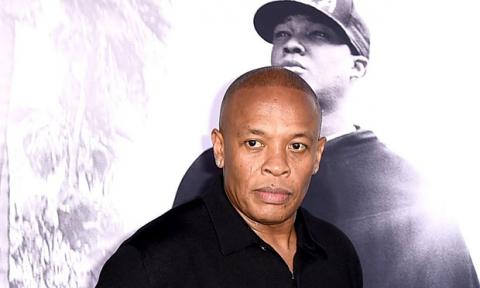The journalist Dee Barnes’s recollection of the time when Dr. Dre beat her—and of its aftermath, and of her feelings about its omission from Straight Outta Compton—is one of the best essays to be published this year. You can read it at Gawker. Some of the details Barnes presents, especially about the physical, mental, and career effects of being attacked by one of the biggest names in music, are wrenching. “When I get migraines, my head does ring and it hurts, exactly in the same spot every time where he smashed my head against the wall,” she writes. “People have accused me of holding onto the past; I’m not holding onto the past. I have a souvenir that I never wanted. The past holds onto me.”
None of the fundamental details of the story are new to the world, nor even contested. Barnes was the host of a hip-hop television show called Pump It Up; her interview with Ice Cube in 1990 so angered his former bandmates in N.W.A. that Dre attacked Barnes in a nightclub bathroom. He pled no contest to assault and settled her civil suit against him out of court. Over the years, he and the others in N.W.A. have blithely acknowledged what happened, and recently in Rolling Stone, Dre issued a vague statement of regret when asked about violence against women: “I made some fucking horrible mistakes in my life.”
If these accusations have been in the public domain for years, then why do they seem to be gaining such wide attention—check the Google News results on the topic—now? The obvious answer is in Straight Outta Compton, the N.W.A. biopic that’s currently ruling the box office. Co-produced by Dre, Ice Cube, and Eazy-E’s widow Tomica Woods-Wright, it purports to be an authentic look at the rise of gangsta rap, and indeed does a powerful job portraying the environments that the band members rose from, the real-world frustration that fed into their incendiary lyrics, the free-spirited collaboration behind the music, the exact causes of N.W.A.’s break-up. But as with many biopics about the living and the recently deceased, the involvement of people so close to the story in the creation of the film means that the effort can’t entirely be trusted—there are agendas at play. (The film’s director, F. Gary Gray, according to Barnes, actually worked as a cameraman for the fateful interview she did with Ice Cube.)
The omission of any mention of violence toward women is a particularly potent example of the biopic dilemma, because it connects to the queasiest part of the legacy of N.W.A. Misogyny has always been part of popular music, whether it’s in vaudeville or rock and roll or even today’s booming electronic-dance scene. But the social conditions gangsta rap rose from—conditions created by a long history of oppression toward minority communities—caused it to make forceful, explicit expressions of contempt toward women fashionable in a way they had never been before. And, it turns out, those expressions of contempt were mirrored in some of the musicians’ behavior. Barnes’s essay points out that for all the political and social weight that N.W.A.’s music carried, it takes a some cognitive dissonance to buy the film’s depiction of its subjects as unambiguously heroic:
Dre, who executive produced the movie along with his former groupmate Ice Cube, should have owned up to the time he punched his labelmate Tairrie B twice at a Grammys party in 1990. He should have owned up to the black eyes and scars he gave to his collaborator Michel’le. And he should have owned up to what he did to me. That’s reality. That’s reality rap. In his lyrics, Dre made hyperbolic claims about all these heinous things he did to women. But then he went out and actually violated women. Straight Outta Compton would have you believe that he didn’t really do that. It doesn’t add up. They’re trying to stay hard, and look like good guys.
Of course, history is littered with examples of famous men whose reputations and status took little or no long-term damage after they were accused of hurting women. And though it doesn’t appear Dre has directly apologized to Barnes or his other female victims personally, he does sound repentant lately: “It was really fucked up. But I paid for those mistakes, and there's no way in hell that I will ever make another mistake like that again," he told Rolling Stone. But all the attention being paid to stories like Barnes's in the year of the Cosby women suggests that Straight Outta Compton may, in addition to educating a wide audience about N.W.A.’s vital achievements, have an unintended consequence. By trying to omit part of the story, it made it bigger.


Spread the word